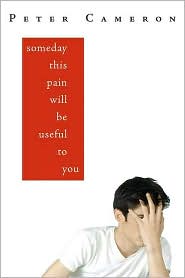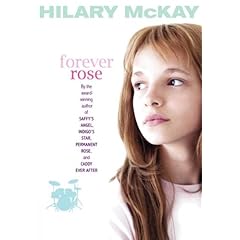
The charming, iced-cookie cover makes this look like innocuous chick-lit. A light, romantic tale. Happy ending, naturally. Anyone would be taken in. Even I, having read Zarr's previous and very gritty teen novel
Story of a Girl, was naive enough to start this at work on my morning break. Big mistake. I ended up reading it all through my lunch hour, obsessively taking it out to the reference desk in the afternoon so I could discreetly peruse it between doing my paid work (I
hardly ever do that--
really) and then finishing it up in the staff room over dinner while great big fat tears rolled uncontrollably down my cheeks. As I sat next to our security guard and tried to hide my face with a blanket.
Well, I get it now. Sara Zarr is just not light and fluffy. I won't be fooled again, even if they cover the whole darned book in pink icing. Next book she puts out, I'll read in PRIVATE.
Sweethearts is decidedly bittersweet. It's the story of two childhood friends, Jennifer and Cameron. Their understanding of each other is unusually deep, since each of them is suffering at the hands of a parent, Jennifer from neglect and Cameron from abuse. They are both children who have faced the dark side of life, and they provide each other with comfort and recognition. As friends, they love each other with a love that sustains them through every painful and unfair thing they have to go through, each insult to their souls that they are powerless to stop, since, after all, they are just kids. They are also witness to each other's suffering. Especially on one terrible day, Jennifer's ninth birthday, when Cameron takes her to his house to give her a present he has made, and Cameron's sociopathic father turns on them both. Jennifer manages to escape, but Cameron does not, and neither one is able to talk about it for years.
One day Cameron vanishes and Jennifer is led to believe he has died. Her grief is intense and she never forgets him. As the years go on she remakes herself with a steely discipline and by high school she is thin, has a boyfriend, and is in with the popular crowd. Her mother has remarried and her home is more stable. She has expectations of university. She has even renamed herself.
Then on her seventeenth birthday, Cameron leaves a card in her mailbox. He had not, after all, died. He has come back to find her. And reconnecting proves difficult and painful, but more real than anything she has done for years.
I think about how there are certain people who come into your life, and leave a mark.
My roommate asks me if I'm in love with Cameron and I say no, not in love. I start to tell her that I do love him, but stop myself before it comes out. It takes some thinking, years of it, in fact. I know I said it to him that night, and I still wonder if he heard me, but as I get older I think--can it really be love if we don't talk that much, don't see each other? Isn't love something that happens between people who spend time together and know each other's faults and take care of each other? Still, by the time I've had my share of boyfriends, I discover that even the ones I truly love never bring on the same kind of feeling I get when I think about Cameron. In the end, I decide that the mark we've left on each other is the colour and shape of love. That's the unfinished business between us.
Because love, love is never finished.
It circles and circles, the memories out of order and not always complete. There's one I always come back to: me and Cameron Quick, lying on the ground in an aspen grove on a golden fall day, the aspen leaves clattering and quaking the way they do. Cameron turning to me, reaching out a small and dirty hand, which I take and do not let go.
This wonderful, subtle story is so rich and layered and yet not one word seems superfluous. Everything Zarr writes about springs right to life before you...Cameron's creepy, sadistic father, the two kids who can understand but can't save each other, the forced nature of Jennifer's relationships with everyone but Cameron, the grown-up Cameron's itinerant, lost quality. The kind of friendship that becomes so deep and all-absorbing it starts to feel like couplehood is absolutely captured here. I got drawn into Jennifer and Cameron's story so quickly, and had trouble coming out at the other end. I really, really wanted them to stay together.
Darn realistic endings. Sniff.













